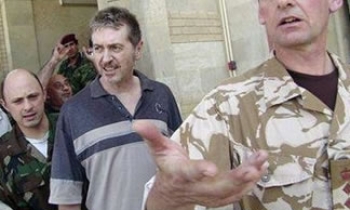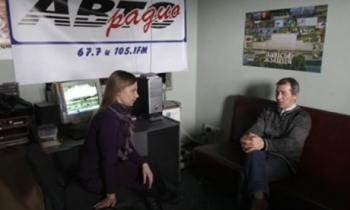New York, June 1, 2007—The Committee to Protect Journalists today renewed its call for the immediate release of captive BBC reporter Alan Johnston following the disclosure of a videotape showing the journalist alive and in apparent good health. The tape was the first proof of Johnston’s condition that captors have offered since the abduction in the Gaza Strip more than two months ago.
The video, posted today on the Islamist Web site Al-Ekhlass, shows a seated Johnston wearing a red sweatshirt against a dark backdrop with a logo of the “Jaish al-Islam” (“Army of Islam”). The little-known Palestinian group has claimed responsibility for the abduction. It was not clear when the videotape was made.
On the video, a portion of which was posted on the BBC’s Web site, Johnston said he had been treated well and had not been subjected to physical abuse. He also criticized British, U.S., and Israeli policies. Videotapes of captives typically include compelled statements. At the end of the video, Johnston began to spell out conditions for his release when he is interrupted by a voice speaking in Arabic who demanded the release of Islamic prisoners, among them Palestinian-born militant Abu Qutada, currently jailed in Britain for ties with al-Qaeda and awaiting deportation to Jordan, The Associated Press reported.
“Although it is unclear when this video was shot, we take heart that it offers confirmation that Alan is alive and that he appears well,” said Joel Simon CPJ Executive Director. “However, we remain alarmed that he is being held against his will. We appeal to those holding him to free him at once.”
Early last month, Jaish al-Islam issued an audio and visual recording on the Internet and in hard copy form in which it claimed to be holding Johnston and had demanded the release of Abu Qutada and other imprisoned militants. The tape, which included pictures of the Iraq war, Muslim prisoners at Guantanamo Bay, and Abu Qatada, showed no images of Johnston.
Jaish al-Islam, headed by Mumtaz Dughmush, is allegedly one of the groups that seized Israeli Cpl. Gilad Shalit in June 2006, according to the BBC. The group is not affiliated with al-Qaeda, the BBC has reported. Mumtaz Dughmush is a member of the powerful Dughmush armed clan operating in Gaza.
Johnston, 44, was seized by four armed men in a white Subaru as he drove near the BBC’s Gaza City office on Al-Wihdah Street around 2 p.m. on March 12, according to CPJ sources in Gaza. Johnston was quickly identified because he threw his business card on the street, according to news reports. Johnston, who joined the BBC in 1991, has been based in Gaza since April 2004.
At least 15 other journalists have been abducted in the Gaza Strip since 2004, according to CPJ research. All of the other abducted journalists were released unharmed. Johnston has been held captive longer than any other journalist abducted in Gaza.
Past kidnappings appeared to be the work of private individuals or groups seeking to exploit foreign hostages for political purposes or to use them as bargaining chips to secure the release of jailed relatives or to win government jobs. To CPJ’s knowledge, none of those responsible for abducting members of the media has ever been apprehended or brought to justice.









